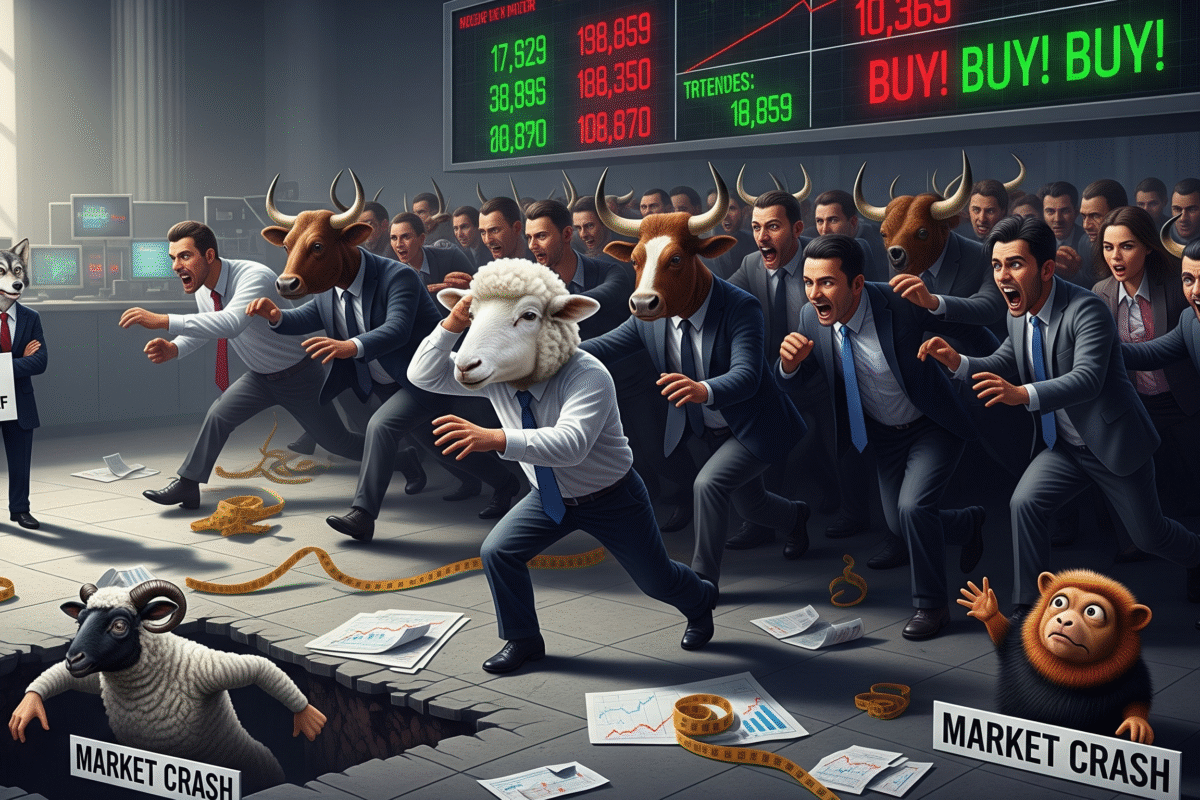Herd Mentality in Stock Market Investing:
Herd Mentality in Stock Market Investing:
The intersection of numbers, psychology, and emotions has long made the stock market an intriguing place to be. The reality is that human behavior significantly influences market movements, even though investors frequently think they act logically by examining balance sheets, financial reports, and market trends. Herd mentality is one of the most powerful psychological influences.
Throughout history, herd mentality has demonstrated its ability to cause irrational spikes and abrupt drops in stock prices, from the dot-com bubble of the 1990s to the GameStop craze of 2021. The definition of herd mentality in stock market investment, its causes, historical instances, and strategies for avoiding it are all covered in this article.
HSBC Cashback Credit Card 2025 – Benefits, Rewards & How to Apply?

What Is Herd Mentality in Investing?
Herd mentality, also known as herd behavior or groupthink, refers to the tendency of individuals to mimic the actions of a larger group. In the context of investing, it means buying or selling stocks simply because “everyone else is doing it,” rather than relying on independent research or analysis.
This behavior often leads to:
- Overvaluation of stocks during market booms
- Panic selling during downturns
- Speculative bubbles that eventually burst
Herd mentality is deeply tied to fear and greed, the two dominant emotions driving markets. When investors see others making quick profits, they fear missing out (FOMO) and rush in. Conversely, during downturns, panic spreads quickly, leading to mass sell-offs.
Herd Mentality: An Examination of Its Psychology
Because it has its roots in behavioral finance and cognitive psychology, herd behavior in financial markets is not random. Among the main psychological motivators are:
1. FOMO, or the fear of missing out:
Despite unreasonable values, investors follow the crowd in order to avoid missing out on possible returns.
2. Aversion to Loss:
People are more afraid of losing than they are of winning. Many people copy what others are selling in order to stay ahead of the competition.
3. Social Evidence:
Even though they don’t fully grasp it, investors presume that if everyone is purchasing a stock, there must be a valid explanation.
4. Overconfidence
People could think that they can “ride the wave” of herd-driven price movements and get out of the market before it crashes.
5. Confirmation Bias:
Rather than seriously evaluating opposing facts, investors look for news or viewpoints that reinforce the mainstream narrative.
Historical Instances of Stock Market Herd Mentality
Numerous lessons about the perils of herd behavior can be learned from history. These are a few of the more noteworthy examples:
1. The 1630s Tulip Mania
The market crashed sharply when Dutch speculators drove tulip bulb prices to astronomical heights, which are frequently referred to as the first known speculative bubble.
2. The 1995–2000 Dot-Com Bubble
Money was poured into internet-based businesses, many of which lacked viable business plans. The Nasdaq lost about 80% of its value when reality set in.
3. The Global Financial Crisis of 2008
A disastrous market crash was caused by widespread speculation in real estate and mortgage-backed securities, which was stoked by herd mentality.
4. GameStop and Meme Stocks (2021)
Social media platforms like Reddit’s WallStreetBets fueled a buying frenzy of GameStop, AMC, and other “meme stocks.” Prices skyrocketed far beyond fundamentals, only to fall sharply later.
5. Cryptocurrency Surges and Crashes
Bitcoin and other digital assets have seen repeated cycles of euphoric buying and panic selling, largely driven by herd behavior and speculative hype.
The Function of Social Networks and the Media
Because of online forums, financial news sources, and social media platforms, herd mentality spreads more quickly than ever before. Within hours, a single Reddit post or viral tweet can impact millions of individual investors.
News outlets, investing forums, and financial influencers frequently magnify market hysteria or anxiety, hastening herd mentality. In the GameStop case, online communities challenged institutional investors and coordinated trades on a massive scale—an unprecedented display of digital-age herd mentality.
Why Investors Should Be Wary of Herd Mentality
Although it may appear safe to follow the crowd, doing so frequently carries serious risks:
- Overpaying for Overhyped Stocks: Purchasing at exaggerated prices exposes investors to risk.
- Emotional Investing: Poor timing is frequently the result of decisions made based more on feelings than on analysis.
- Market Volatility: Price fluctuations are magnified by herd behavior, which makes the market more unstable.
- Destruction of Wealth: A large number of individual investors arrive late and leave with losses.
Signs of Herd Mentality in the Market
Investors should watch for these warning signals:
- Rapidly rising stock prices without strong fundamentals
- Heavy media coverage and celebrity endorsements of certain investments
- Social media hype driving trading activity
- Sudden spikes in trading volume
- Widespread use of phrases like “everyone is buying” or “this stock can only go up”
Ways to Steer Clear of Herd Mentality
1. Conduct Your Own Research
Prior to making an investment, always examine the financial statements, long-term prospects, and company fundamentals.
2. Establish Specific Objectives
Define your risk tolerance, investment horizon, and objectives before making decisions.
3. Make Your Portfolio More Diverse
Avoid concentrating wealth in a single hot stock or sector.
4. Think Long-Term
Focus on sustainable investments rather than chasing short-term gains.
5. Follow Contrarian Thinking
Some of the most successful investors, like Warren Buffett, advise being “fearful when others are greedy, and greedy when others are fearful.”
6. Limit Emotional Influence
Use stop-loss strategies or automate investments to avoid emotional decisions.
The Advantages of the Herd Mentality
Despite its unfavorable perception, herd mentality isn’t necessarily bad. In some cases, it:
- Creates Liquidity: Herd-driven trading increases market activity.
- Accelerates Price Discovery: Collective sentiment can reveal hidden demand or risk.
- Drives Innovation Funding: Tech booms often attract capital that fuels real progress, even if bubbles eventually burst.
Expert Opinions on Herd Behavior
- Warren Buffett: Famously warns against herd mentality, advising independent thinking.
- Robert Shiller (Nobel Prize Winner): Highlights how narratives and collective psychology drive market fluctuations.
- Benjamin Graham (The Intelligent Investor): Advocated focusing on intrinsic value instead of crowd-driven trends.
Conclusion: Think Beyond the Herd
Herd mentality has shaped some of the most dramatic moments in financial history, from speculative bubbles to sudden market crashes. While it’s tempting to follow the crowd, successful investing requires discipline, patience, and independent analysis.
Investors must learn to recognize herd-driven trends, resist emotional impulses, and stay focused on long-term fundamentals. In the stock market, blindly following others may feel safe in the short run—but in the long run, it’s often the riskiest strategy of all.
Central Bank Digital Currencies vs Cryptocurrencies: The Future of Digital Money
Central Bank Digital Currencies vs Cryptocurrencies: The Future of Digital Money
